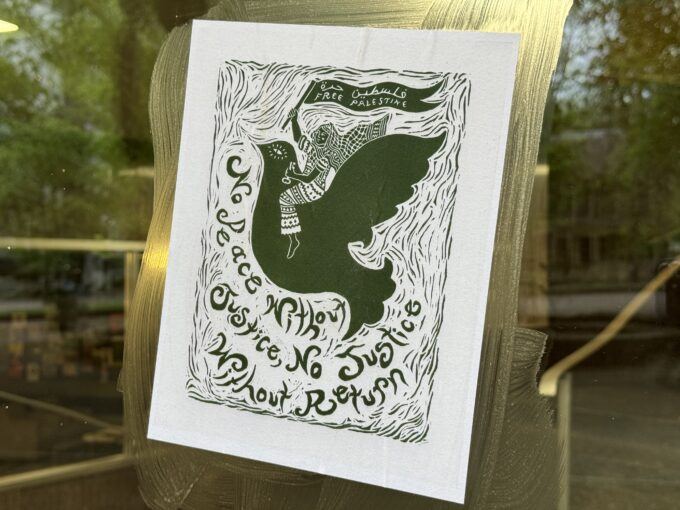
Photograph by Nathaniel St. Clair
While the world debates whether Palestinians deserve electricity, young people in Gaza are building tech incubators from the rubble.
Not one. Three.
Taqat began with a single solar panel and a car battery. A flicker of light in a blackout zone. Today it is Gaza’s largest incubator: three hubs — Gaza City, Deir al-Balah, Nuseirat — sustaining more than 400 freelancers, creating over 100,000 hours of work each month, and keeping alive the possibility of a future Israel is determined to erase.
This is not “resilience.” This is refusal.
Empire’s Favorite Word
Western NGOs and donors love to say “resilience.” It is how they launder complicity. It is how they celebrate survival without ever naming the hand on the trigger.
But nothing about Taqat is resilience in that empty sense. Taqat is resistance. It is infrastructure under siege. It is solar panels standing in for a bombed-out grid. It is adolescents coding while their schools lie in rubble. It is Gaza insisting: we will not disappear.
What They Built While the World Looked Away
The numbers themselves are an indictment:
$500,000+ in monthly earnings by Gaza freelancers.
100,000+ hours of digital work produced every month.
50+ new jobs created.
2,000 people on a waitlist, desperate to join.
All of this in a place where:
80% of the population is unemployed.
1.9 million people are living in tents.
70% of the internet and power grid lies in ruins.
The same governments that subsidize Silicon Valley’s failure machines subsidize Israel’s war machine. One burns capital on apps nobody needs. The other burns people. Gaza’s youth are showing them both what innovation actually looks like.
Brick by Brick
Taqat’s timeline is the anatomy of defiance:
June 2024 — one solar panel. One battery. A single shared desk.
September 2024 — expansion into a second hub as more than a million people were displaced south.
December 2024 — training programs scaled to hundreds of youth.
February 2025 — a third branch opened.
Now — Gaza’s foremost incubator, with over 500 active members and an ecosystem of training, mentorship, and global work opportunities.
“For us, Taqat symbolizes perseverance and resistance in turning challenges into opportunities, and remaining creative despite all circumstances. It is an expression of dignity through work, productivity, and building a better future,” said Noor Nashwan, International Relations Coordinator at Taqat.
This article is part of an ongoing collaboration with Taqat, who first reached out to me — and I take seriously the responsibility of carrying their story with care, though their determination to keep building under siege speaks louder than any words of mine.
Where the occupation drops bombs, Palestinians drop fiber cables. Where schools collapse, adolescents join Taqat Hero— a program teaching coding, design, and digital arts to teenagers who have lost years of education but refuse to lose their futures.
Even Cambridge University is collaborating, offering English training and mentorship. The irony is brutal: students in Britain are shielded from the word Palestine, while students in Gaza are denied schools altogether. And yet, it is Gazan teenagers who are the ones coding their way into the world.
The Lie of “Innovation”
Silicon Valley spends billions to build apps that fail in eighteen months. Governments subsidize billionaires who call themselves disruptors.
Meanwhile, in Gaza, real disruption is happening:
Shared laptops running off solar panels.
Freelancers writing code by generator light.
Adolescents turning curiosity into skill under bombardment.
“When I felt like I had lost my inspiration, Taqat was the space that encouraged me to listen to my own voice as an artist,” said Raghad El-Shaikh Khalil, a digital artist. “That’s when I realized that inspiration was never lost—it just needed Taqat.”
“Amid the challenges of freelancing, Taqat has been the safe haven and supportive space for every freelancer striving for excellence,” said Anwar Abu Al-Qumboz, a graphic designer.
“Taqat was not just support in a difficult moment, but a new starting point—the environment that gave us the confidence to shape our future as freelancers, and the drive to turn our challenges into opportunities,” said Mahmoud Al-Sharafa, a software engineer.
Sharif Naim, co-founder of Taqat, explained that the name itself “embodies light, resistance, and challenge” — and that even under siege, the incubator continues supporting freelancers so they can keep creating and building.
Innovation in the West is a branding exercise. In Gaza, it is survival.
Why Taqat Matters
The architecture of genocide depends on flattening Palestinians into only two categories: victims or threats. Victims to pity, threats to eliminate. Never builders. Never creators. Never peers.
Taqat punctures that script. It shows Palestinians as what empire cannot allow them to be seen as: a people who work, think, create, and refuse annihilation.
This is why their story matters. Not because it is “inspiring”. But because it is political. To build under genocide is not inspiration. It is insurrection.
A Call Beyond Charity
Taqat does not need pity. It does not need another glossy NGO brochure. It needs solidarity. Partnerships. Digital work opportunities. Publicity. Funding that does not siphon through the aid industry’s moral laundromats but goes directly to the people making futures possible.
The post From the Rubble, They Built Three Incubators appeared first on CounterPunch.org.
This content originally appeared on CounterPunch.org and was authored by Anita Naidu.